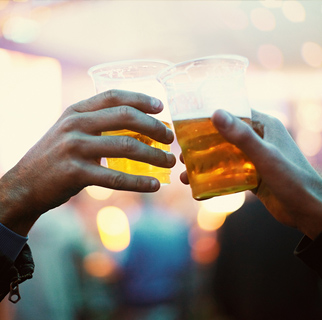Social Drinking vs. Problem Drinking

People with unhealthy alcohol use (also called alcohol use disorder or AUD) can't
always predict how much they will drink, when they will stop, or what they will do
while drinking. And it can be common for people with alcohol use disorder to deny
the negative effects of drinking or that they even have a problem.
Alcohol is considered a drug because it depresses the central nervous system and can
disrupt mental and motor skills. It can also damage internal organs when used excessively.
Unhealthy alcohol use can be harmful physically, emotionally, and economically.
The effects of alcohol
Alcohol can lessen tension, reduce inhibitions, and ease social interactions. But
drinking too much can:
-
Be physically and psychologically addicting
-
Cause impaired memory, coordination, and judgment
-
Damage the heart, liver, and nervous system
-
Lead to birth defects
People who abuse alcohol also put themselves and others at risk if they drive or operate
machinery after drinking too much.
Unhealthy alcohol use can start at any age. There are no good predictors of when it
may start. But a family history or current family alcohol or drug abuse problems may
influence the start of personal drinking problems. Some people have been heavy drinkers
for many years. But others develop a drinking problem later in life. Sometimes a drinking
problem is triggered by major life changes that cause depression, isolation, boredom,
and loneliness.
Safe drinking
If you drink alcohol, take these steps to reduce risks:
-
Eat before drinking to help slow the alcohol's absorption and slow its effects.
-
Don’t drink alcohol when you are thirsty. Reduce your thirst before starting to drink
alcohol.
-
Don't drink when you are under stress, emotionally upset, or tired.
-
Know when to stop. Think about why you want to drink. You shouldn't drink just to
get drunk.
-
Don't mix alcohol with drugs or medicines.
-
Never drink and drive.
Signs of problem drinking
If you are concerned about your drinking or think someone you care about has a drinking
problem, look for these signs:
-
Frequent uncontrolled drinking episodes
-
Drinking until drunk
-
Going to work drunk or drinking on the job
-
Driving while drunk
-
Doing something under the influence of alcohol that they would not otherwise do
-
Getting in trouble with the law or being injured due to drinking
-
Having problems at school, with social relationships, or with family members because
of drinking
-
Using alcohol to decrease anxiety or sadness
-
Gulping drinks
-
Frequently having more than 2 drinks a day for men or 1 drink a day for women or older
adults (with a standard drink being one 12-ounce bottle or can of beer or a wine cooler,
one 5-ounce glass of wine, or 1.5 ounces of 80-proof distilled spirits)
-
Lying about or trying to hide drinking habits
-
Needing more alcohol to feel its effects
-
Feeling grouchy, resentful, or unreasonable when not drinking
-
Having health, social, or financial problems caused by drinking
What you can do
-
Learn more facts about alcoholism.
-
Treat alcoholism as a disease, not a moral failure or lack of willpower.
-
Be understanding, but don't be an enabler by protecting or lying for a person with
an alcohol use disorder, or denying the problem exists.
-
Encourage treatment. Your healthcare provider can help find treatment resources.
-
Respect the recovered alcoholic's choice to stay away from alcohol.